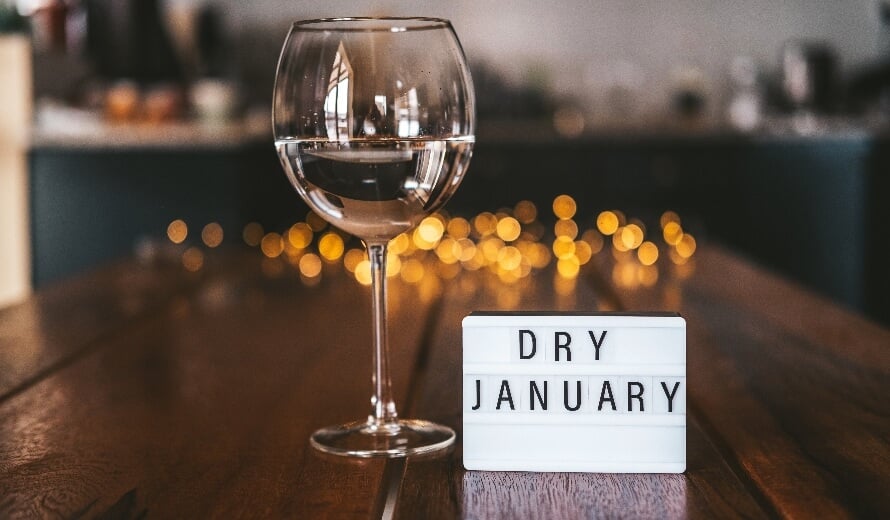Every January, millions of people take on a simple challenge: no alcohol for 31 days.
Some do “Dry January” to boost their well-being, while others are simply curious—what happens when you skip booze for a month?
The reasons for starting may vary, but the benefits often don’t—most experience better health, more energy, sharper thinking, and a clearer understanding of their drinking habits.
Here’s what research says about Dry January’s health benefits—and how one month alcohol-free could transform your well-being.
Key Takeaway
- “Dry January” is a month-long challenge to abstain from alcohol.
- Dry January’s main physical health benefits include better liver function, reduced blood pressure, improved cardiovascular health, better control of blood sugar levels, decreased body fat, and reduced cancer risk.
- There are also mental health advantages of Dry January. For example, people often experience less stress and anxiety, better sleep and energy levels, and greater control over drinking.
- Dry January’s “side effects” are all positive—it helps you save money, shed extra weight, and develop healthier habits.
- You can drink non-alcoholic beer during Dry January, as long as it contains little-to-no alcohol (usually less than 0.5% ABV).
What Is “Dry January?”


“Dry January” is a month-long challenge to abstain from alcohol. It started in 2013 as a public health campaign by Alcohol Change UK to help people reset their relationship with drinking.
Since then, it’s grown into a global movement, with millions participating each year.
The concept is simple: For the 31 days of January, you commit to going alcohol-free. And that means no wine with dinner, no beer after work, and no cocktails on the weekend.
Dry January’s Health Benefits
Dry January isn’t just a test of willpower—it’s a chance to see how cutting out alcohol can improve your health.
The advantages of Dry January often surprise people—they go much further than helping you avoid hangovers.
Here’s what science says about the health benefits of Dry January
Improved Physical Health


One of the most immediate health benefits of Dry January is improved physical well-being. Research shows that when you abstain from alcohol—even for a short time—several markers of health improve:
- Better Liver Health: Studies show that even a month without alcohol can reduce liver fat by up to 40%, lowering the risk of liver disease and other complications.
- Reduced Blood Pressure: In one study published in the journal BMJ Open, systolic blood pressure decreased by 6.6% and diastolic blood pressure by 6.3% in people who abstained from drinking alcohol for just one month.
- Improved Cardiovascular Health: Sustained lower alcohol consumption helps maintain healthier cholesterol levels and heart function.
- Lower Blood Sugar Levels: Giving up alcohol can improve your body’s ability to regulate blood sugar, which reduces the risk of diabetes and other metabolic issues.
- Decreased Body Fat: Many people lose weight by cutting out alcohol’s “empty” (non-nutiritous) calories. In the BMJ Open study, participants lost an average of 1.5% of their body weight after a month of abstinence.
- Reduced Cancer Risk: Alcohol abstinence decreases levels of cancer-related growth factors (proteins that regulate cell growth) like VEGF and EGF, which may contribute to the development of cancers such as breast, liver, and colorectal cancer.
Better Mental Health
Dry January doesn’t just benefit your body—it can work wonders for your mind, too.
Studies show that taking a break from alcohol can lead to noticeable improvements in mental health and emotional well-being:
For instance, studies show that abstaining from alcohol, even for a month, can reduce feelings of anxiety and tension, leaving you feeling calmer and more balanced.
Many people who do Dry January also report feeling more optimistic and better equipped to handle life’s challenges without alcohol as a crutch.
Enhanced Sleep, Energy, and Focus


For many, one of Dry January’s health benefits that has the biggest impact is its effect on sleep, energy, and focus.
Studies have found that when people take part in temporary alcohol abstinence challenges, like Dry January, they typically sleep better.
And as your sleep quality improves, so does your energy during the day. Many participants report feeling more alert, productive, and motivated without the sluggishness caused by alcohol.
Greater Control Over Drinking
Dry January is an opportunity to reset your relationship with alcohol. And for many, this allows them to gain greater control over their drinking, often long after the challenge finishes.
In a study published in the European Journal of Public Health, people who took part in Dry January improved their ability to refuse alcohol.
Six months after the challenge, they were more confident in saying no to alcohol in social settings, when they felt emotional, and when opportunities to drink randomly presented themselves.
They also had significantly lower scores on the Alcohol Use Disorders Identification Test (AUDIT) six months after completing Dry January. In other words, they had adopted healthier drinking habits and reduced risky drinking behavior over the long term.
Dry January’s “Side Effects”
When people think about cutting out alcohol, they often assume they’ll experience negative side effects—like withdrawal symptoms or difficulty coping in social situations.
But unless you drink very heavily, the reality is quite different. For most people, Dry January’s “side effects” are overwhelmingly positive.
For instance, most people find they save a lot of money. Alcohol isn’t cheap, and a month-long break can leave your wallet feeling significantly fuller.
Cutting out alcohol can also help you lose weight. Not only are alcoholic drinks often full of empty calories, but they also slow down fat burning while your body processes the alcohol. During this time, any fat or carbs you eat are stored rather than burned.
And that’s not all—being drunk often makes people overeat, which only adds to the problem.
Some people claim that abstaining from alcohol during Dry January makes their skin clearer and their hair stronger and shinier.
And others find it helpful for developing healthier habits overall. That is, with alcohol out of the picture, they spend more time sleeping, exercising, and doing other activities that positively affect their well-being.
In other words, the side effects of Dry January are all wins. In fact, they’re often some of the most rewarding parts of the challenge.
FAQ #1: Why do people do Dry January?
People participate in Dry January for various reasons, but most are looking to reset their relationship with alcohol and explore the benefits of going alcohol-free.
Other common motivations include improving physical health, enhancing mental well-being, saving money, and developing healthier habits. For many, it’s also a way to challenge themselves and see how life changes without alcohol.
FAQ #2: Does Dry January help your liver?
Yes, Dry January can significantly benefit your liver health. Research shows that abstaining from alcohol for even one month can lead to measurable improvements.
For instance, a study published in Alcohol and Alcoholism found that moderate drinkers who abstained for 28 days experienced a significant reduction in gamma-glutamyl transferase (GGT), an enzyme that indicates liver stress.
Similarly, another study in BMJ Open found that people who abstained from alcohol for a month reduced alanine aminotransferase (ALT) and GGT levels, both of which indicate improved liver health.
Other research shows that forgoing alcohol for a month can significantly reduce liver fat, which lowers the risk of liver disease.
FAQ #3: Can you drink non-alcoholic beer during Dry January?
Yes, you can drink non-alcoholic beer during Dry January, as long as it contains little-to-no alcohol (usually less than 0.5% ABV).
Many participants find non-alcoholic beer to be a helpful alternative that allows them to enjoy the social aspects of drinking without breaking the challenge.
However, some people prefer to avoid even faux-alcoholic drinks to fully disconnect from the habit of drinking altogether—it’s up to you.
Scientific References +
- Ballard, Jackie. “What Is Dry January?” British Journal of General Practice, vol. 66, no. 642, 30 Dec. 2015, pp. 32–32, www.ncbi.nlm.nih.gov/pmc/articles/PMC4684010/,
- Oldham, Melissa, et al. “Exploring Changes in Temporary Abstinence in Increasing and Higher Risk Drinkers in England and Dry January Participation in Users of the Try Dry App in the UK between 2020 and 2021.” BMC Public Health, vol. 22, no. 1, 26 Sept. 2022,
- Mehta, Gautam, et al. “Short-Term Abstinence from Alcohol and Changes in Cardiovascular Risk Factors, Liver Function Tests and Cancer-Related Growth Factors: A Prospective Observational Study.” BMJ Open, vol. 8, no. 5, 5 May 2018, www.ncbi.nlm.nih.gov/pmc/articles/PMC5942469/, Accessed 27 Mar. 2020.
- eClinical Medicine. “Dry January: The Best Option for Public Health?” EClinicalMedicine, vol. 43, 24 Jan. 2022, p. 101279, www.ncbi.nlm.nih.gov/pmc/articles/PMC8808158/, Accessed 24 Feb. 2022.
- de Visser, Richard O, and Richard Piper. “Short- and Longer-Term Benefits of Temporary Alcohol Abstinence during “Dry January” Are Not Also Observed among Adult Drinkers in the General Population: Prospective Cohort Study.” Alcohol and Alcoholism, vol. 55, no. 4, 11 May 2020, pp. 433–438,
- “APA PsycNet.” Psycnet.apa.org, psycnet.apa.org/doiLanding?doi=10.1037%2Fhea0000297.
- de Visser, Richard O., et al. “The Growth of “Dry January”: Promoting Participation and the Benefits of Participation.” European Journal of Public Health, vol. 27, no. 5, 22 Sept. 2017, pp. 929–931,
- Schutz, Yves. “Role of Substrate Utilization and Thermogenesis on Body-Weight Control with Particular Reference to Alcohol.” Proceedings of the Nutrition Society, vol. 59, no. 4, Nov. 2000, pp. 511–517, Accessed 16 Oct. 2019.
- Munsterman, I D, et al. “Biochemical Effects on the Liver of 1 Month of Alcohol Abstinence in Moderate Alcohol Consumers.” Alcohol and Alcoholism, vol. 53, no. 4, 3 May 2018, pp. 435–438, Accessed 12 Apr. 2024.
- Mehta, Gautam, et al. “Short-Term Abstinence from Alcohol and Changes in Cardiovascular Risk Factors, Liver Function Tests and Cancer-Related Growth Factors: A Prospective Observational Study.” BMJ Open, vol. 8, no. 5, 5 May 2018, www.ncbi.nlm.nih.gov/pmc/articles/PMC5942469/,

